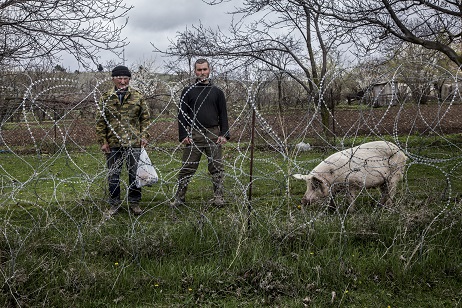Council of Europe: Russia responsible for protecting human rights in Georgia’s breakaway regions

The Council of Europe has today adopted an important decision for Georgia in which the organisation reiterates its unequivocal support for the sovereignty and territorial integrity of the country within its internationally recognised borders.
The decision was made by the Committee of Ministers' Deputies of the Council of Europe with absolute majority and attached responsibility to the Russian side to protect human rights in Georgia’s Russian-occupied regions.
The Georgian side assessed the decision as an "important step forward” in terms of ensuring protection of human rights in Georgia’s occupied territories.
The adopted document emphasised the responsibility of Russia as a state exercising effective control over Georgia’s occupied territories to ensure the protection of human rights there.
In particular Russia is responsible:
- To guarantee the right to an education in the native language;
- To create conditions allowing for the safe and dignified return of internally displaced persons (IDPs) and refugees, including through protecting their right to property;
- To remove any impediment, restriction or limitation to the right to freedom of movement across the administrative boundary lines and to prevent arbitrary detention of persons;
- To ensure that people living in these territories are protected from discriminatory treatment; and
- To conduct an effective investigation of all allegations of human rights violations in these territories.
The document also stated the Committee of Ministers' Deputies regretted that despite the continued calls for Russia to reverse its process of installing artificial obstacles (barbed wire fences) along the administrative boundary lines, which divided families and communities and violated human rights and fundamental freedoms, Russia continued this through various means, including by installing new demarcation signposts.
The Committee of Ministers' Deputies welcomed various initiatives taken by the Government of Georgia in its two occupied regions Abkhazia and Tskhinvali (South Ossetia), by providing free medical service to the residents of these regions and more.
The Committee of Ministers' Deputies also called on Russia to facilitate and grant unrestricted access to the territories beyond the control of the Georgian authorities to the existing bodies of the Council of Europe.
The Decision stated that measures taken by Russia with regard to the Georgian regions of Abkhazia and Tskhinvali (South Ossetia), especially the conclusion of so-called treaties on alliance and strategic partnership/integration, undermined the ongoing efforts to strengthen security and stability in the region, and clearly violated Georgia’s sovereignty and territorial integrity.
The Committee called upon Russia to stop and reverse this process and comply with its international law obligations and commitments, including the 12 August 2008 Ceasefire Agreement and its Implementing Measures of 8 September 2008.
"This Decision of the Committee of Ministers' Deputies is an important step forward in terms of ensuring human rights protection in Georgia’s occupied territories,” Georgia’s Deputy Foreign Minister David Zalkaliani said.
"Georgia not only remains on the Council of Europe’s political agenda but there is also a significant rise of interest in the country, which is further proved by the fact that the Council of Europe, over the past few years, has been paying an increasing amount of attention to the situation in Georgia’s occupied territories.”
Shortly after the Committee’s decision was announced Georgia’s Foreign Ministry issued a statement saying it welcomed the decision and expressed its gratitude to the Consul of Europe’s Member States for their support.
 Tweet
Tweet  Share
Share